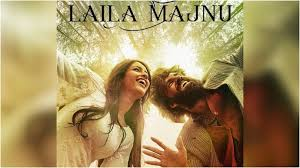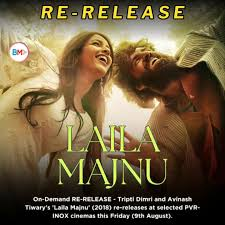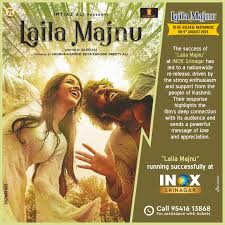Laila Majnu: Reimagining an Eternal Love Story
The timeless tale of Laila Majnu has been an enduring part of literary and cinematic culture, capturing the imagination of audiences across generations. Rooted in Persian folklore, the story of Laila and Majnu is a classic narrative of star-crossed lovers, whose passionate but ill-fated love defies societal norms and transcends time. The recent re-release of this legendary tale in cinema brings fresh perspectives and contemporary relevance to a story that remains as poignant today as it was centuries ago.
Table of Contents
Historical and Literary Background
The story of Laila Majnu dates back to 7th-century Arabia and was popularized by the Persian poet Nizami Ganjavi in his 12th-century work. The narrative revolves around Qays ibn al-Mulawwah, who falls deeply in love with Laila, a beautiful girl from his tribe. Despite their mutual affection, societal and familial pressures prevent their union, leading Qays to madness and earning him the epithet ‘Majnu’ (madman). Their love remains unfulfilled in the material world but is immortalized in their tragic end, symbolizing an eternal spiritual union.

Cinematic Adaptations
The story of Laila Majnu has been adapted into numerous films over the decades, each version reflecting the cultural and artistic sensibilities of its time. From silent films in the early 20th century to musical dramas in the 1950s and 60s, the tale has been told and retold in various forms and languages. Each adaptation has brought new dimensions to the characters and their enduring love story, making it resonate with different generations.
The Modern Re-release
The re-release of Laila Majnu in contemporary cinema aims to bridge the gap between the ancient and the modern, bringing a fresh narrative approach to this age-old story. Directed by Sajid Ali and produced by Imtiaz Ali, the film explores the timeless themes of love, sacrifice, and societal constraints, while infusing modern sensibilities and cinematic techniques.

Casting and Performances
The modern re-release features a young and talented cast, with Avinash Tiwary playing Qays/Majnu and Tripti Dimri as Laila. Their performances have been widely praised for their intensity and authenticity, capturing the raw emotions and deep passion that define their characters. The chemistry between the lead actors brings a fresh energy to the story, making it relatable to contemporary audiences while maintaining the essence of the original tale.
Direction and Cinematography
Sajid Ali’s direction breathes new life into the narrative, blending traditional storytelling with modern cinematic techniques. The film’s visual aesthetics, captured beautifully by cinematographer Sayak Bhattacharya, enhance the emotional depth and lyrical quality of the story. The landscapes, from the vast deserts to the bustling urban settings, serve as metaphors for the lovers’ tumultuous journey, adding layers of meaning to the visual storytelling.
Music and Soundtrack
The soundtrack of Laila Majnu, composed by Niladri Kumar and Joi Barua, plays a crucial role in conveying the emotional nuances of the story. The songs, penned by renowned lyricists like Irshad Kamil, evoke a range of emotions, from the ecstasy of first love to the anguish of separation. The music, with its blend of traditional and contemporary elements, resonates deeply with the audience, reinforcing the timeless appeal of the narrative.
Themes and Relevance
The re-release of Laila Majnu delves into several themes that remain relevant in today’s world.
- Love and Madness: The portrayal of Qays’s descent into madness, driven by his unfulfilled love for Laila, raises questions about the boundaries between love and obsession. The film explores the transformative power of love, which can lead to both profound joy and profound suffering.
- Societal Constraints: The lovers’ struggle against societal and familial pressures highlights the ongoing conflict between individual desires and social expectations. The film underscores the timeless nature of this conflict, showing how societal norms can both shape and constrain personal relationships.
- Spiritual Love: Beyond the physical and emotional aspects of their love, Laila Majnu delves into the idea of spiritual love that transcends earthly boundaries. The story suggests that true love is not confined to the material world but continues to exist on a higher, spiritual plane.

Audience Reception
The re-release of Laila Majnu has garnered positive reviews from both critics and audiences. The film’s fresh take on the classic story, combined with strong performances and compelling visuals, has struck a chord with viewers. Many have appreciated the film’s ability to stay true to the essence of the original tale while making it accessible and relevant to modern audiences.
Cultural Impact
The enduring popularity of Laila Majnu speaks to its deep cultural significance. The story has been a source of inspiration for countless works of art, literature, and music over the centuries. Its themes of love, sacrifice, and defiance against societal norms continue to resonate across cultures and generations, making it a universal narrative.
The re-release of Laila Majnu not only revitalizes interest in this timeless tale but also prompts reflection on the nature of love and its place in contemporary society. By bringing the story to a new generation of viewers, the film ensures that the legend of Laila and Majnu will continue to inspire and move audiences for years to come.
indianfastearning.comTriptii Dimri says Laila Majnu re-release gives the film ‘a second chance’: Not all films get one
Conclusion
The re-release of Laila Majnu is more than just a retelling of an ancient love story; it is a celebration of the enduring power of love that transcends time and space. Through its compelling narrative, powerful performances, and evocative music, the film reaffirms the timeless relevance of Laila and Majnu’s tale. As audiences immerse themselves in this reimagined version of the classic story, they are reminded of the universal themes of love, sacrifice, and the eternal quest for union that lie at the heart of human experience.
https://www.youtube.com/results?search_query=laila+majnu+re+release







